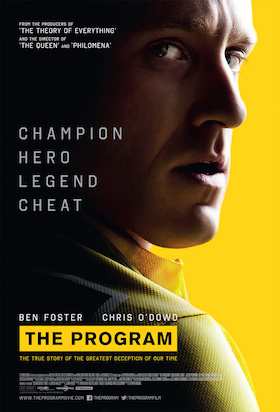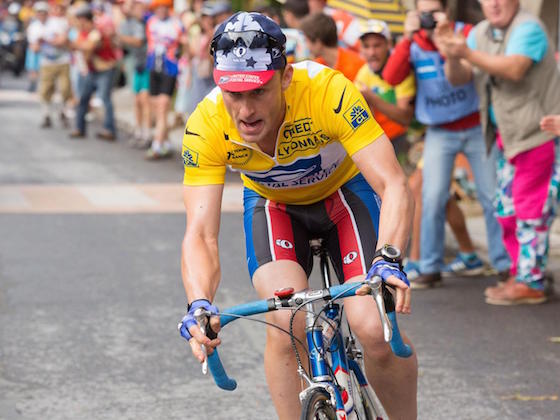Content to skim the surface of an athletic controversy whose details are now public knowledge, director Stephen Frears has crafted a film about disgraced cyclist Lance Armstrong (Ben Foster) that says a lot, but informs surprisingly little. Indeed, The Program, on VOD and in limited theatrical release tomorrow, might be a wonderfully acted, intriguing picture, yet it never explores any of the deeper truths about its main characters, investigative journalism, or professional cycling at-large.
The movie is largely the story of Armstrong as an up-and-coming (and later, champion) cyclist who is seduced by the competitive advantage that performance-enhancing drugs offer. Based on the years-long work of journalist David Walsh (Chris O’Dowd), The Program is a dramatization of Armstrong’s initial dabbling in P.E.D.’s, his subsequent cancer struggle, and his journey towards professional glory and eventual disgrace. Split between two narratives, one focusing on Armstrong, and the other on the journalist trying to take him down, Frears’ film is ultimately unsuccessful in its attempt to juggle these two potatoes: both of them hot.
Early on, The Program paints a picture of Armstrong as just another victim of cycling’s widespread doping problem. Fiercely competitive, to be sure, the Armstrong of the early-to-mid-1990s is a clean-cut athlete who comes to the sad conclusion that doping is the only way to succeed in the sport he loves so much. Desperate to keep up with his rivals, all of whom are using testosterone, blood doping, E.P.O., and other dangerous P.E.D. cocktails, Armstrong dives in with both feet. A sudden cancer diagnosis nearly kills the cyclist, however, and despite the long odds, Armstrong emerges from his illness leaner, focused, and more determined than ever to win whatever the cost.
After his recovery, Armstrong assembles a team of trainers and riders whose singular purpose is to see him win the Tour de France, and through a combination of disciplined training and extensive doping protocols, the man is successful. Meanwhile, although the vast majority of the world is content to sit back and marvel at the inspiring story, one journalist, David Walsh, has his doubts. As a guy who has followed Armstrong throughout his career, Walsh can’t help but to wonder how a man who was a mediocre cyclist prior to battling cancer could emerge from that experience as a better athlete: one capable of trouncing every other serious competitor in his sport.
The Program bounces back and forth between Walsh’s dogged investigation and Armstrong’s racing, doping, and lying, seemingly content to divide its focus between these two stories. This is like making a movie that shares equal time between Superman and Lois Lane: there’s just not enough time in a two hour movie to give each character their due. Although one could craft a creative, interesting movie about Lois’ crazy life flying around with, and being saved by Superman, if that picture kept Superman front-and-center the way The Program does with Armstrong, it would invariably draw attention from the narrative’s driver. The result here is a movie that doesn’t know what it wants to be: a journalistic procedural, or a sports bio pic.
While it is established that the professional cycling field was skewed in such a way as to make clean riding impossible for any serious contenders, the internal conflict of Armstrong is never explored, thus the audience doesn’t get a sense of the man as an agent for his own decisions. Conversely, although Walsh makes a few statements about how he loves the sport, and hates to see it tarnished, Frears’ film never establishes why the journalist feels personally responsible for bringing Armstrong down. Consequently, The Program suffers from a split focus, laying out the “how’s” of the story, yet withholding much of the “why’s” that would have provided new insight into this world-famous scandal.
Frears makes no attempt to explore how Armstrong becomes the win-obsessed bully that he is at the end of The Program, or what (if any) conflicts Armstrong experienced, either from the doping or the attacks he initiated against anyone who spoke out against him. Similarly, Walsh is never developed in a way that explains why the investigation was so important to him. What’s worse, The Program never offers any glimpses of self-doubt concerning his investigation’s initial lack of evidence, or the fact that by bringing down Armstrong, Walsh would be destroying a guy who is the inspiration to millions of cancer victims.
And that’s too bad. Anyone who has even a passing memory of Armstrong as a public figure between 1999-2009 should be impressed with Ben Foster’s work, for he not only looks the part, but his bearing, vocal work, and posture in the saddle all harken back to the genuine article. Indeed, there are times when it is easy to forget that Foster, and not Armstrong, is on-screen. Another standout is Jesse Plemons as Floyd Landis, one of Armstrong’s teammates whose conscience (and a failed drug test) convinces him to come clean about doping in pro cycling. Plemons does fantastic work conveying the guilt and anxiety the real Landis almost-certainly faced when confronted with the opportunity to race alongside Armstrong…so long as he adhered to the intensive drug regimen required. The conflict he expresses in the little screen-time he’s allowed says more than all of Walsh’s and Armstrong’s scenes put together.
The end result is a film that is engaging and interesting, yet doesn’t add anything new to a narrative that has enjoyed exhaustive media coverage. Because the filmmakers behind The Program owed so much to Walsh for the movie’s filling, the journalistic side of the story gets near-equal attention as Armstrong, which isn’t a mistake in and of itself. It’s just that it is hard to digest so much Lois Lane when the movie keeps putting Superman in the foreground.







Comments on this entry are closed.